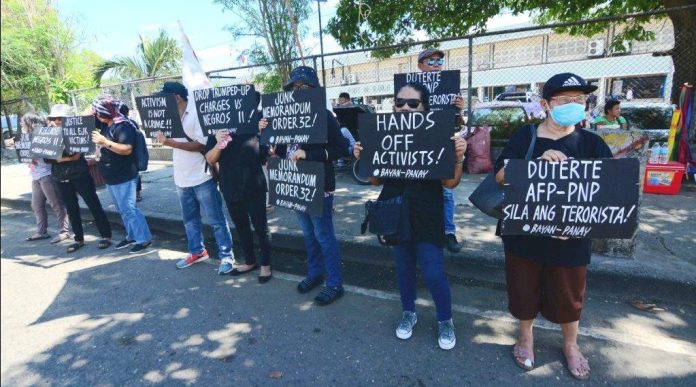
ILOILO City – Cause-oriented group Bagong Alyansang Makabayan (Bayan Panay) staged a picket in front of Camp Delgado, headquarters of the Police Regional Office 6 (PRO-6), to protest Memorandum Order No. 32 from President Rodrigo Duterte ordering the deployment of more troops to Negros Island, Samar and the Bicol Region.
According to Elmer Forro, secretary general of Bayan Panay, the memo resulted to bloody operations of government troops primarily targeting activists for a year now.
Memorandum Order No. 32 was issued in November last year.
“Search warrants were irregularly issued and resulted in hundreds of arrests and killings, particularly in Negros,” said Forro during the Nov. 22 picket.
Citing data from human rights alliance Karapatan, Forro said political prisoners in Negros reached 91 while extrajudicial killings of farmers and human rights lawyers climbed to 89.
Memorandum Order No. 32 enforced a “de facto martial rule” and has “exceeded previous regimes in terms of human rights violations,” said Forro.
The recent Oct. 31 mass arrests of activists in Bacolod City and Negros Occ. was a result of Memorandum Order No. 32, he added.
Bayan Panay demanded the scrapping of the memo “together with other policies that continue to criminalize dissents like Executive Order 70 which targets democratic organizations through profiling, denial of government service, harassment, and intimidations.”
Executive Order 70 issued by the President in December 2018 institutionalized the “whole-of-nation approach” in combatting insurgency. Its rationale is: Neither the Armed Forces nor any law enforcement squad alone can conquer insurgence. All agencies aboard should do its share in ending communist insurgency across the country. The support of all stakeholders must be enlisted.
According to Forro, however, anti-people policies such as rice liberalization, oil deregulation, jeepney phaseout, labor contractualization, privatization of basic social services and utilities, and low wages, among others, are what is pushing the people to dissent.
“These acts are within the metes and bounds of our democratic rights enshrined in the Constitution and fall far from being considered as criminal acts,” stressed Forro./PN



